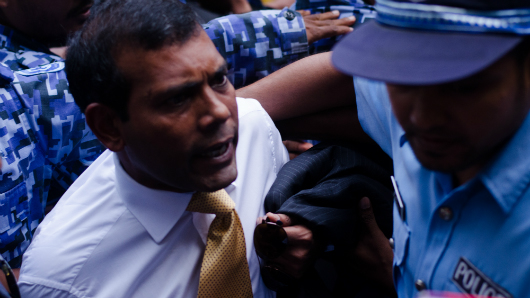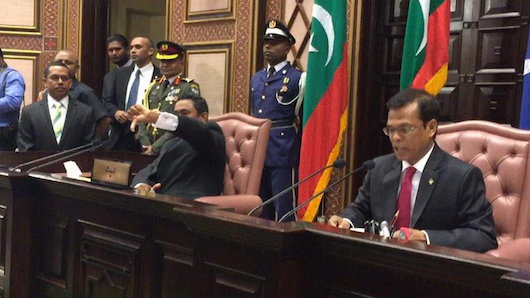First published in Foreign Policy. Republished with permission.
With the swearing-in of President Abdel Fattah al-Sisi in early June, Egypt has turned full circle. This is just the latest version of a familiar and depressing tale.
After all the hope, optimism, and national pride that followed the revolution and the successful overthrow of Hosni Mubarak’s bloody 30-year rule, Egyptians are back to square one: Another military strongman has won another contested election, while his political opponents are either in hiding, in jail, or in their graves.
Events in Egypt are similar to those in my own country, the Maldives. We, too, suffered at the hands of a dictator for three decades. We, too, had our own peaceful revolution that swept away the old regime and ushered in new democracy. In 2012, that democracy was snatched away from us by a coup d’état. Since then, we have seen our freedoms and our electoral process undermined.
The experiences of the Maldives and the Arab Spring countries highlight the difficulty of embedding democracy in Muslim nations that have long been governed by authoritarian regimes. Overthrowing the dictator is hard enough, but for democrats, securing the long-term gains of the revolution is proving more challenging.
Just because you’ve pulled out the weeds doesn’t mean that flowers will grow. Like a garden, democracy must be planted and nurtured – or the weeds will grow back stronger than ever.
From my own experience – as, in turn, a democracy activist, the Maldives’ first democratically elected president, and the victim of a coup – one of the most important things democrats must do early on is to build a political party around a unified cause; this is a task at which the Egyptian liberals fell short.
Democracy needs infrastructure in place to implement it. Political parties are the most important institution in a new democracy; they are the necessary nuts and bolts, the means for delivering democracy. Once established, they force their members to learn the new tools of contesting democratic power: grassroots mobilization, policy formulation, election campaigning, media relations, and so on.
This process embeds democratic principles among large sections of the population, which in turn creates extra pressure for more democratic reform.
When Maldivians decided they’d had enough of their dictatorship, a number of activists, including myself, slipped out of the country and formed the Maldivian Democratic Party (MDP). In those days, back in 2004, political parties were banned in the Maldives, so operating in exile was our only option.
We could have focused all our energy on fomenting street protests, but we recognized that there was no point overthrowing the regime if we weren’t in a position to win an election or govern properly. When the Maldivian dictator, Maumoon Abdul Gayoom, begrudgingly allowed competitive elections in 2008, the MDP was an established political party. We won the presidential election with 54 percent of the vote.
In contrast, Egyptian liberals focused their attention on bringing down Mubarak. They were successful, and we all held our breath at the prospect of a free and democratic Egypt. But once Mubarak fell, the liberals found that they didn’t have a strong, unified political party that could successfully compete in the ensuing elections. The Muslim Brotherhood, which had run an underground political machine for decades, swooped in and clinched victory. So the most important lesson for aspiring democrats, before anything else, is this: Focus on building your political party.
The creation of successful political parties, though, is rarely enough to properly embed democracy. This brings me to my second lesson: Beware of judges. In the Maldives, like Egypt, the former dictator appointed all of the sitting judges. These judges, loyal to the old guard, hell-bent on maintaining their power, and steeped in anti-democratic ideology, actively undermined the new democracy.
Judges blocked revenue-raising measures, protected members of the former regime from corruption probes, and granted themselves ever more power. In the Maldives, a new constitution passed in 2008, granting judges independence, as part of the separation of powers.
But like giving Dracula the keys to the blood bank, this decision gave unfettered power to a judiciary that is rotten to the core. This problem still haunts the Maldives. In last year’s presidential elections, for instance, the Supreme Court constantly meddled in the vote to favor old-guard candidates, annulling and postponing votes, intimidating the Elections Commission, and making up the law as they went along. Ahead of parliamentary elections earlier this year, the court was at it again, sacking the Elections Commission chief and threatening his staff.
Confronting a corrupt, but independent, judiciary is particularly challenging for new rulers. The international community is largely clueless about how to deal with the problem. In the Maldives, for instance, the one organization that should have helped, the United Nations, instead considered judicial independence to be sacrosanct — a misguided approach that treated poorly educated, corrupt, and often criminal judges as if they were U.S. Supreme Court justices.
Kenya may provide a better example of the sort of radical judicial reform needed in post-revolution or, in its case, post-conflict societies. In Kenya, the new government, with international support, overhauled its judiciary and established an independent “Vetting of Judges and Magistrates Board.” Unqualified, incompetent, or corrupt judges were removed from office. Whatever the method, the international community needs a new approach for dealing with inherited judiciaries in fledgling democracies.
This brings me to my third and final lesson: Never give up. Democratic movements need patience, optimism, and determination. People often ask me how I remain optimistic about the future of my island country, with respect to both its democratic trajectory and its survival in the face of rising sea levels (the Maldives is one of the world’s lowest-lying nations).
But when you choose to be a democracy activist in an authoritarian regime, or indeed a proponent of firm action to combat climate change, you have little choice but to remain optimistic. The alternative is too bleak.
This applies to everyone, from Egyptian liberals, to Maldivian human rights defenders, to pro-democracy activists in countries like Burma and Libya: Never give up — and never assume that your cause is lost. Even when you face disappointment, there are usually unexplored avenues through which you can continue the struggle. In September 2013, after my party won the first round of presidential elections, the Maldives Supreme Court annulled the vote and got the Elections Commission to re-run the elections as many times as it took for our party to lose.* (The photo above shows Mohamed Nasheed at a protest to demand a run-off vote in Male.) After all this, some Maldivians told me that they felt despair over the future of their country. I responded: “Don’t presume that this is the end of the book. We’re only in the middle of the story. Don’t be so hasty as to predict how the story will end.”
Ranil Wickremesinghe, the former prime minister of Sri Lanka, once told me: “When the music stops, you must sit [down].” This may be true for political leaders, but not for democracy activists. Authoritarian regimes are more fragile than they appear. With a little push, they often collapse under the weight of their own contradictions. So be tenacious, strategic, and, above all, patient.
The peaceful and legitimate transfer of power is the defining characteristic of functioning democracy; it is how society grows and develops, and it is the overarching goal of any pro-democracy activist. During President Obama’s second inauguration I heard a speech that, coming less than a year after the Maldives’ coup, sent a chill down my spine. Senator Lamar Alexander summed up everything democracy activists should strive for: the regular transfer of power, through peaceful and legitimate means. He said: “There is no mob, no coup, no insurrection. This is a moment when millions stop and watch.” For democracy activists around the world, huddled in their cafés or counting down the days in their prison cell, it is this moment that makes it all worthwhile.
Likes (0)Dislikes
(0)Dislikes (0)
(0)
 (0)Dislikes
(0)Dislikes (0)
(0)

